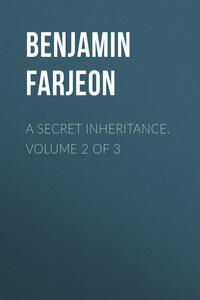The investigations in the course of which Emilius related his version of what had passed between him and his ill-fated brother-I use the phrase to give expression to my meaning, but indeed it is hard to say to which of the brothers, the living or the dead, it can be applied with the greater force-took place in private, only the accused and the magistrate, with a secretary to write down what was said, being present. The magistrate in his conversations with Doctor Louis and Gabriel Carew, did not hesitate to declare his belief in the prisoner's guilt. He declined altogether to entertain the sentimental views which Doctor Louis advanced in Emilius's favour-such as the love which it was well known had existed between the brothers since their birth, the character for gentleness which Emilius had earned, the numberless acts of kindness which could be set to his credit, and the general esteem which was accorded to him by those among whom he had chiefly lived.
"My experience is," he said, "that all pervious records of a man's life and character are not only valueless but misleading when the passions of love and jealousy enter his soul. They dominate him utterly; they are sufficiently baleful to transform him from an angel to a demon. He sees things through false light, and justifies himself for the commission of any monstrous act. Reason becomes warped, the judgment is distorted, the sense of right-doing vanishes; he is the victim of delusions."
Doctor Louis caught at the word. "The victim!"
"Will that excuse crime?" asked the magistrate severely.
Doctor Louis did not reply.
"No," said the magistrate, "it aggravates it. Admit such a defence, and let it serve as a palliation of guilt, and the whole moral fabric is destroyed. What weighs heavily against the prisoner is his evident disinclination to reveal all he knows in connection with the hours he passed in the forest on the night of his brother's death. He is concealing something, and he seeks refuge in equivocation. When I accused him of this his confusion increased. I asked him whether his meeting with his brother was accidental or premeditated, and he was unable or unwilling to give me a satisfactory reply. He made a remark to which he evidently wished me to attach importance. 'There are matters between me and my brother,' he said, 'which it would be difficult, perhaps impossible, for an unsympathetic person to understand.' 'I am such a person,' I said. 'Undoubtedly,' was his reply; 'you are seeking to convict me out of my own mouth of a crime I did not commit.' 'I am seeking to elicit the truth,' I said. 'Have these mysterious matters between you and your brother of which you speak any bearing upon his death?' Observe, that out of regard for the prisoner's feelings I used the word death instead of murder; but he corrected me. 'They have,' he said, 'a distinct bearing upon his murder.' 'And you cannot explain them to me?' I asked. 'I cannot,' he replied. 'You expect me, however, to place credence in what you say?' I asked. 'I do not,' he said; 'it is so strange even to me that, if you were in possession of the particulars, I should scarcely be justified in expecting you to believe me.' After that there was, of course, but little more to be said on the point. If a criminal chooses to intrench himself behind that which he is pleased to call a mystery, but which is simply an absurd invention for the purpose of putting justice off the track, he must take the consequences. Before our interview was ended it occurred to me to ask him whether he intended to persist in a concealment of his so-called mystery. He considered a little, and said that he would speak of it to one person, and to one person only. Upon that I inquired the name of the person, saying that I would seek him and send him to the prisoner. Emilius refused to mention the name of the person. Another mystery. As you may imagine, this did not dispose me more favourably towards him, and I left him to his meditations."
"Having," said Doctor Louis, "a thorough belief in his guilt."
"There is not a shadow of doubt in my mind," said the magistrate.
"You once entertained an esteem for him."
"True; but it only serves to prove how little we really know of each other. This mask that we wear, and which even in private we seldom remove, hides so much!"
"So much that is evil?"
"That is my meaning."
"You are growing pessimistic," said Doctor Louis sadly.
"Late events and a larger experience are driving me in that direction," replied the magistrate.
"Have you any objection to granting me a private interview with Emilius?"
"None whatever. You have but to name your own time."
"May Mr. Carew see him also?"
"If he wishes."
In this conversation Gabriel Carew had borne no share. This was due to an absolute fairness on Carew's part. Prejudiced as he was against Emilius, he was aware that he could say nothing in favour of the accused, and he did not wish to pain Doctor Louis by expressing what he felt. When the magistrate left them, Doctor Louis said, "The one person to whom Emilius is willing to confide is either you or myself."














